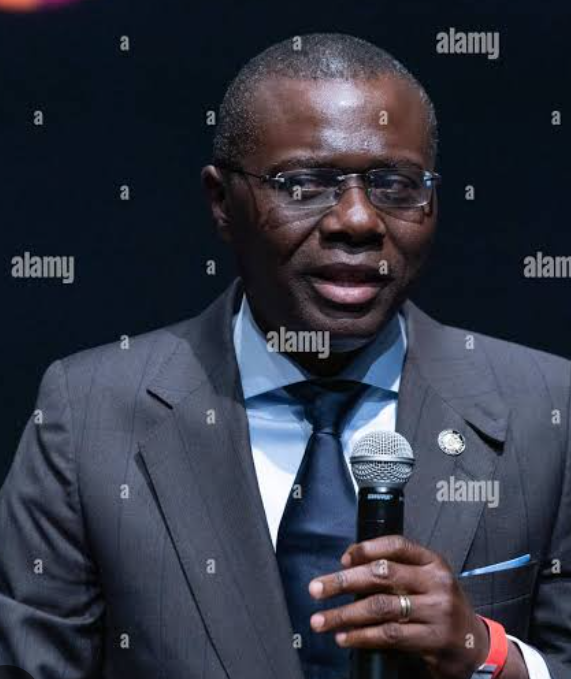News
LG Autonomy: ‘Fed Govt Sued Lagos In Error’–Sanwo-Olu

..…CJN Hails Lagos For Setting Good Example In Justice Dev
By Kayode Sanni-Arewa
Lagos State should have been left out of the legal action instituted by the Federal Government against Governors at the Supreme Court over alleged misconduct in the administration of Local Governments, Governor Babajide Sanwo-Olu said yesterday.
To Sanwo-Olu, it was a legal anomaly for the Federal Government to join Lagos in the Supreme Court matter, decades after the Local Governments in the State had been enjoying full autonomy.
Sanwo-Olu, who spoke in support of the suit, however said the Attorney General of the Federation should have identified those that were not in compliance with the law before filing a blanket lawsuit against all states.
The Governor spoke at the on-going Justice Reform Summit organised by Lagos State Judiciary with the theme: “Enhancing the Administration of Justice for Economic Growth, Investment Protection and Security in Lagos”.
The summit, attended by the Attorney General of the Federation and Minister of Justice, Mr. Lateef Fagbemi, is being held at Marriott Hotels, Ikeja.
Sanwo-Olu said infringement on the local council autonomy was an affront to the spirit of the constitution to which the judiciary must make a clear interpretation for equity and fairness.
He said a better justice system would protect the interests of parties and discourage actions limiting efficiency of any government entity.
He said: “It is interesting to read the news that the Honorable Minister of Justice and Attorney General of the Federation has sued all the 36 states because Governors did not give autonomy to the third tier of government. The only mistake, which I am going to tell our Attorney General, is that some of us are in compliance.
“The Attorney General should have done his due diligence to identify which states are not in compliance, so that we don’t sue all the 36 states together. You can determine which states are not violating the Constitution. If it is three, four or five states are in compliance, then you can sue the 31 states violating autonomy of the Local Governments. That is part of the back work that we need to do.”
Sanwo-Olu said the judicial reform must remain on the agenda in a functional society in order to improve administration of the justice system and make the court the last hope of the common man.
The Governor said the judiciary in Lagos had remained a beacon in protecting the rule of law and setting good examples for other jurisdictions in dispensation of justice. But he challenged judges and law officers to change the status quo in order to raise the standard of the justice system.
Drawing a parallel with Singapore – a fishing village with environmental similarities with Lagos, Sanwo-Olu said Singapore’s faith in rule of law and fairness transformed the efficiency of the country’s justice system, leading to the country’s rapid economic growth and prosperity.
He said: “Just like Lagos, Singapore has no resources. Singapore is what it is today because of Ease of Doing Business. It takes less than 30 minutes to register a business in Singapore, which makes it to surpass many countries in Ease of Doing Business. Singapore has one of the best judiciary system in the world; they have quick turnaround time in mediation and dispute resolution.”
Sanwo-Olu said Lagos needed strong judicial system to attain all its investment potential, while promoting transparency and accountability.
The Governor urged the Bench and the Bar to collaborate to promote an efficient justice system.
Chief Justice of Nigeria (CJN), Justice Kayode Ariwoola, represented Justice Iyabode Yerima of the Supreme Court, hailed Lagos judicial system for being “a forerunner” in justice development, stressing that other jurisdictions usually borrowed from examples set by Lagos.
The CJN listed some of landmark examples set by Lagos judiciary in the justice system to include Administration of Criminal Justice laws, which after implementation, set the template for the designing of Criminal Justice Act at the National Assembly.
Fagbemi, SAN, represented by Mr. Fernandez Marcos-Obiene, said robust and transparent reforms embarked on by Lagos in the justice system had promoted economic growth, pledging that the Federal Government would continue to provide platforms for reforms that would improve public trust in the judiciary.
Chief Justice of Lagos, Justice Kazeem Alogba, commended Gov. Sanwo-Olu for his non-interference stance in judicial matters in Lagos.
Alogba said: ”No society thrives without robust justice system. The essence of any society is to have justice, without which there will be no peace and order. Security is an integral element of a robust justice system. When you have judges who are incompetent and corrupt in the system, the society will suffer for it.”
Other speakers at the two-day event included the President of the Nigerian Bar Association (NBA), Mr. Yakubu Maikyau, SAN, and Lagos State Attorney General and Commissioner for Justice, Lawal Pedro, SAN, among others.
News
Canada deports more people, particularly those rejected for refugee status

By Kayode Sanni-Arewa
Canada deported more people last year to hit its highest annual level of removals in about a decade, overwhelmingly deporting people whose refugee claims were rejected, data obtained by Reuters showed.
By late November, Canada’s removal numbers had reached their highest point since at least 2015, when the governing Liberals led by Prime Minister Justin Trudeau came to power
The government has also budgeted more money for deportations this year.
Trudeau’s government, now in its final days, has sought to show Canadians it is getting tough on immigration amid a rising backlog of refugee claims and a backlash against immigrants over concerns that immigration is exacerbating a housing shortage.
Canada’s border agency said the spike in deportations is tied to a “significant increase” in the number of people applying for asylum since 2020, prompting it “to enforce removal orders in a more efficient and timely manner.”
Reuters requested border agency data on deportations, excluding people who left of their own accord and those sent back to the United States as part of a bilateral agreement under which would-be asylum-seekers are turned back.
The remaining total shows Canada deported 7,300 people between January 1 and November 19, 2024, an 8.4% increase over all of 2023 and a 95% increase over 2022.
The border agency did not provide equivalent figures for all of 2024. This week, it posted data online from 2019 to 2024 that do not break down deportations excluding returns to the US under that bilateral agreement. This data also showed an increase in the number of deportations.
About 79% of the 7,300 people deported in the first 11 months of last year were deported because their claim for refugee status had been rejected. That is up from about 75% in 2023 and 66% in 2022.
About 11% of the people deported last year through November 19 were removed for non-compliance with the conditions of their stay in Canada unrelated to a refugee claim, for example, for overstaying a visa. About 7% were deported because they had committed a crime either in Canada or elsewhere.
A spokesperson for Public Safety Minister David McGuinty did not immediately respond to questions about the deportations.
A spokesperson for the border agency said in an email that removal numbers fluctuate.
“The number of removals of those who received a negative asylum determination have increased each year since emerging from the pandemic,” wrote the spokesperson, Luke Reimer.
“These efforts are essential in maintaining the integrity of Canada’s asylum system.”
Canada has been dealing with record numbers of refugee claims, although the monthly totals dropped to 11,838 in January from 19,821 in July. There were 278,457 claims pending as of last month – the highest pending total in decades.
A campaign flag for US President Donald Trump flutters from a private residence between the Canada and US border in Mooers Forks, New York, US, Feb 4, 2025. REUTERS/Brian Snyder
MORE MONEY FOR DEPORTATIONS
One concern with these removals, especially those targeting failed refugee claimants, is that people can be deported while still appealing decisions about the risk they face if returned to their home countries, said Aisling Bondy, president of the Canadian Association of Refugee Lawyers.
“They could be removed even if there is significant error in the risk determination,” she said, worrying people are being deported to places they will face persecution.
Reimer said in an email that the agency “only actions a removal order once all legal avenues of recourse that can stay a removal have been exhausted.”
The rise in refugee claimant deportations speaks to the government’s priorities, including a tough stance on migration, said University of Toronto law professor and Human Rights Chair Audrey Macklin.
“You can decide that you want to make a show of how many people you are deporting to show that you are effective at policing the border,” Macklin said. “Then you go with people who are easier to find and remove, and those are going to be, often, refugee claimants.”
he prospect of deportation could also deter would-be refugee claimants, she said.
Canada is on track to deport even more people in the coming years: Late last year, the government pledged C$30.5 million ($21.3 million) over three years to increase deportations.
Canada Border Services Agency spent C$65.8 million on removals in 2023-24, up from C$56 million the year before.
At the same time, Canada has pledged C$1.3 billion toward border security to appease US President Donald Trump as he threatens sweeping tariffs on Canadian imports.
The ranks of those eligible for deportation could grow.
Canada is slashing temporary and permanent immigrant numbers and part of its plan relies on more than 1.2 million temporary residents, including workers and students, leaving the country next year, and another 1.1 million leaving the following year, according to government figures.
Immigration Minister Marc Miller has said Canada will deport people who do not leave on their own.
“It is people’s choice not to leave, and if they don’t, they face the consequences – including, after due process, deportation,” he told Reuters last year.
News
UNIVERSITY OF BUCKINGHAM (UOB) INTERNATIONAL DIPLOMA OF EDUCATION (IDE)

By Kayode Sanni-Arewa
Obio/Akpor Federal Constituency in partnership with The University of Buckingham will be sponsoring 150 classroom teachers in Obio/Akpor Federal Constituency for the University of Buckingham (UoB) International Diploma of Education (iDE) January cohort of the 2025-2026 session.
Powered by: Rep. O. K. Chinda
Interested primary and secondary school teachers residing in Obio/Akpor Federal Constituency are expected to fill out the form below for the constituency selection process.
Form: https://forms.gle/rbjWgMk8oBRwqxgf7

For enquiries: Call or WhatsApp Marvin Chinda on:- +2348068581032
The minimum academic requirement is an O’level / WASSCE with 5 credits (Inclusive of Mathematics and English) and currently a classroom teacher.
Kenneth George-Oparati
(Administrator),
Obio/Akpor Federal Constituency Office
Port Harcourt, Rivers State
News
NAHCON endorses four Islamic banks for Hajj savings scheme

By Kayode Sanni-Arewa
The National Hajj Commission of Nigeria has endorsed four banks to support and implement the Hajj Savings Scheme.
An official in the Information and Publications Division of NAHCON, Abdulbasit Abba, announced the development in a statement in Abuja on Tuesday.
Abba stated, “A significant milestone for the Hajj Savings Scheme, three new Islamic banks—Taj Bank, Alternative Bank, and Lotus Bank—have officially joined the initiative to support Nigerian pilgrims.
“These banks will operate alongside Ja’iz Bank, bringing the total number of participating financial institutions to four
The official signing and acknowledgment of the appointment letters took place at Hajj House in Abuja, where representatives from the three new banks received their official letters from the National Hajj Commission of Nigeria (NAHCON).
“The Commissioner for Policy, Personnel, Management, and Finance, Prince Abdullazak Aliu, presented the letters on behalf of the Chairman/CEO, Prof. Abdullahi Usman.
“This expansion marks a new era for the Hajj Savings Scheme, ensuring a more robust financial structure to facilitate pilgrimage arrangements for Nigerian Muslims.”
-

 News21 hours ago
News21 hours agoAmaewhule, 26 Other Lawmakers Never Defected To APC, Rivers Chair Confirms
-

 News20 hours ago
News20 hours agoSenate committee on health invites stakeholders to a one-day public hearing on 3 major Bills
-

 News21 hours ago
News21 hours agoHeavy security beef up as APC holds NEC Meeting in Abuja
-

 News21 hours ago
News21 hours agoEx-President, Buhari, El-Rufai, Amaechi Absent As APC Holds NEC Meeting
-

 News13 hours ago
News13 hours agoThey’re after my life i – NAFDAC DG raises alarm
-

 News21 hours ago
News21 hours agoServices, petrol refining sectors pilot GDP growth to 3.84%
-

 News13 hours ago
News13 hours agoPolice Halt Attempt To Invade Kano Emir’s Palace, Nab 17 Suspects
-

 News16 hours ago
News16 hours agoEmefiele: Judge turns down request to withdraw from trial







